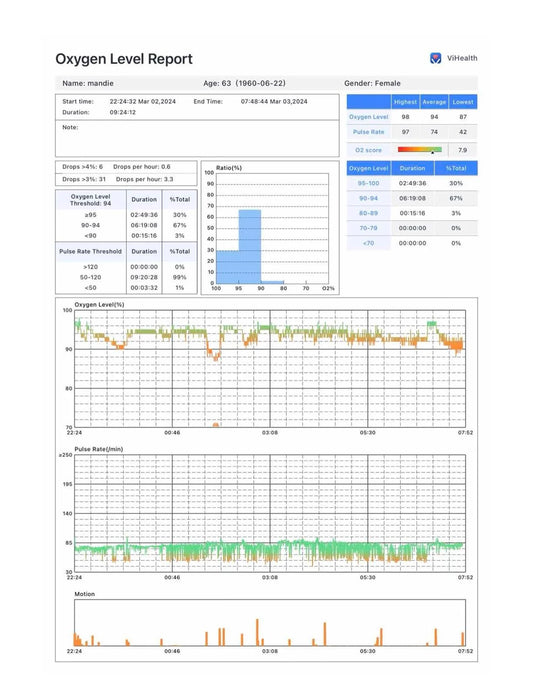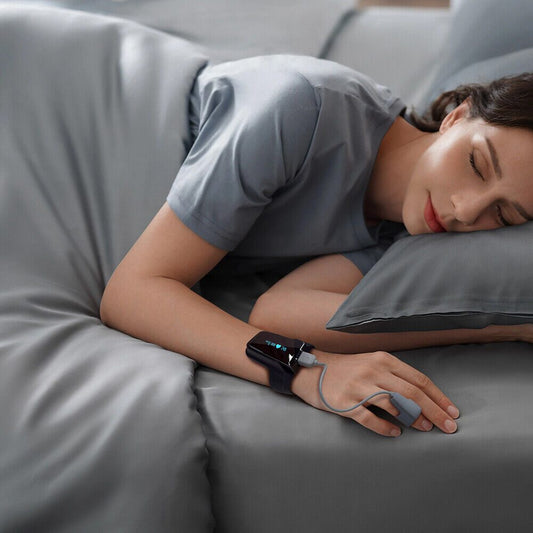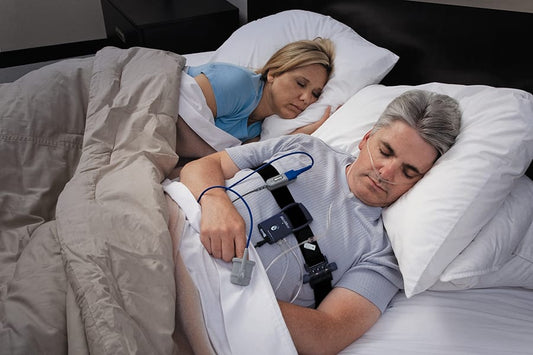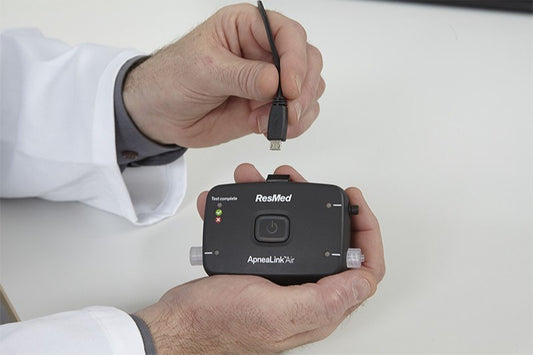
Sleepco At-Home Sleep Studies
If you're experiencing unexplained daytime sleepiness, low energy levels, or frequent night-time awakenings, you may benefit from one of our physician-certified at-home sleep studies. We currently offer Level 4 (screening) and Level 3 (basic polysomnographic) sleep studies and provide you with test results, findings, and treatment plan / recommendations. If you believe you require a more advanced form of sleep study (level 2), please contact us for this service.
-
3-Night Oximetry Screening Sleep Study with Smart Analysis
Vendor:SleepcoRegular price $150.00 NZDRegular priceUnit price / per -
At-Home 3-Night Polysomnographic Sleep Study
Vendor:SleepcoRegular price From $349.90 NZDRegular priceUnit price / per$399.00 NZDSale price From $349.90 NZDSale
Collapsible content
How do I know if I need a sleep study?
Consider a sleep study if you experience:
- Loud snoring or gasping during sleep
- Daytime fatigue despite sleeping enough hours
- Morning headaches
- Difficulty concentrating during the day
- Observed pauses in breathing during sleep
- Waking up feeling unrefreshed
What are the different types of sleep tests available?
Sleep tests help doctors figure out why you're having trouble sleeping or feeling tired during the day. A good place to start is either a Level 4 overnight oximetry test or a Level 3 home sleep study, especially if you haven't had a sleep test before.
The most basic test (Level 4) is overnight oximetry, where you wear a small clip on your finger while you sleep. This measures your oxygen levels and heart rate and is often used as a first step to check for sleep apnea. While it's simple and can be done at home, it provides limited information. These tests typically cost between $50-200.
A Level 3 home sleep study is more detailed and can also be done in your own bed. You wear several sensors that monitor your breathing, oxygen levels, and heart rate. Some Level 3 devices also track your body position and movement. These tests usually cost between $200-600, depending on your location and provider.
The most comprehensive test (Level 1) is a sleep study done in a sleep lab, called a polysomnogram. You spend the night in a special room while technicians monitor your brain waves, heart rhythm, breathing, oxygen levels, and body movements. These tests are the most expensive, typically ranging from $1,000-3,000 or more.
For people who feel very sleepy during the day, doctors might recommend a daytime sleep test called MSLT (Multiple Sleep Latency Test). This involves taking several short naps during the day while being monitored, helping diagnose conditions like narcolepsy.
Another option is wearing a special watch-like device (called an actigraph) for one to two weeks. This tracks your sleep patterns by monitoring movement, which is helpful for understanding sleep habits and timing issues.
What are the costs involved?
Level 4 Oximetry Sreening Test:
- Test and basic report: $150
- Test and advanced report: $250
Level 3 home sleep study:
- Study with basic report: From $300
- Study with specialist report: From $600
Level 2 home sleep study:
- Starting from $1500
What happens during a home sleep study?
You will:
- Receive equipment and clear instructions
- Attach simple sensors before bedtime - usually on your finger, wrist, around your abdomen or chest and electrode stickers if undertaking in level 2 study.
- Sleep in your own bed
- Follow your usual sleep routine
- Return the equipment the next day (unless instructed to wear for additional nights)
- Receive results within 1-2 weeks
How should I prepare for an in-lab sleep study?
We recommend:
- Maintaining your normal routine
- Avoiding caffeine after noon
- Following your usual bedtime
- Bringing comfortable sleepwear
- Taking regular medications unless advised otherwise
How long does it take to get results?
Oximetry screening test: Less than 7 days, often within 48 hours.
Level 3 Home sleep study results: 1-2 weeks, usually within 1 week unless further analysis required
In-lab study results: 2-3 weeks
What if I'm diagnosed with sleep apnea?
If you're diagnosed with sleep apnea, our team will guide you through your treatment options. For most patients, CPAP (Continuous Positive Airway Pressure) therapy is the recommended treatment. We'll help you understand your diagnosis and determine which type of therapy best suits your needs.
Getting Started:
Our expert team will help you select the right equipment and mask. You'll receive training on how to use and care for your equipment, including proper mask fitting and cleaning procedures. We provide easy-to-follow guides and support materials to help you get comfortable with your therapy.
Follow-up Care:
We'll schedule follow-ups to check your progress and make any needed adjustments. Initial follow-ups typically occur within the first few weeks, then at 3 months, and annually after that. Your machine's data will be reviewed to ensure the therapy is working effectively.
Comfort and Support:
Common concerns like mask fit, pressure settings, or difficulty adapting to therapy will be addressed promptly. We offer various mask options and can adjust settings to improve comfort while maintaining effective treatment. Our team is available to help with any issues that arise during your therapy.
Alternative Options:
If CPAP therapy isn't suitable, we can discuss alternatives such as oral appliances (custom-made devices that help keep your airway open) or referrals to specialists. Some patients may benefit from lifestyle changes like weight loss or sleep position adjustment as complementary treatments.
Equipment Care:
We'll show you how to maintain your equipment properly and provide guidelines for regular cleaning and replacement of supplies. Many insurance plans cover regular supply replacements, and we can help coordinate this process.
Ongoing Success:
Our goal is to help you achieve better sleep and improved health. We're committed to supporting you through:
- Regular progress checks
- Quick response to any concerns
- Adjusting treatment as needed
- Simple troubleshooting guidance
We are currently adding to this service
If you feel any information is missing on this page, please get in touch: support@sleepco.nz. If you have any questions about at-home sleep studies, please feel free to send us an email or start a chat (chat icon on the bottom right of this page)




